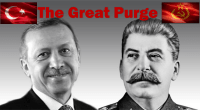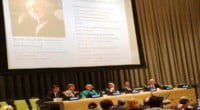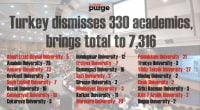What was the ‘postmodern coup’ about?

Date posted: March 5, 2012
Şahin Alpay, Sunday March 4, 2012
In the summer of 1996, a coalition government was formed in Turkey between the Islamist Welfare Party (RP) led by Mr. Necmettin Erbakan and the center-right True Path Party (DYP) led by Mrs. Tansu Çiller, who had declared herself to be the foremost opponent of the RP.
This coalition government was forced to resign the next summer with the culmination of a psychological warfare campaign designed and pursued by the Turkish Armed Forces (TSK) against it. The campaign began with the decisions made on Feb. 28, 1997, by the National Security Council (MGK), which brings together top government and military leaders, concerning measures to stop the rise of “religious fundamentalism.” Next year the Constitutional Court closed down the RP and banned Mr. Erbakan and a number of RP politicians from politics for five years.
The military’s intervention in 1997 to force the elected government to step down has been dubbed the “postmodern coup” because it fell short of the seizure of power by the military, as was the case in the three previous interventions of 1960, 1971 and 1980. The public debate in Turkey during the last week focused on what the “postmodern coup” was about and its lessons. That debate is highly welcome because it is a step forward in Turkey’s endeavors to consolidate liberal democracy by learning from past mistakes.
Why did the military intervene? The driving force of all military coups, coup threats and abortive coups in the history of Turkish democracy is the “founding philosophy” of the Turkish state — that is, Kemalism. The military has legitimized its political role and secured its position as a state within the state by its loyalty to Kemalism that bestows guardianship of the regime to state elites, and commits them to a highly authoritarian form of secularism and uniculturalism. The military staged the postmodern coup mainly because it found it unacceptable that an Islamist politician had taken over the office of prime minister.
But had the military not, like in all previous interventions, enjoyed the ideological support and encouragement of a powerful part of civil society, it might not have been able to achieve its aim. Needless to say, rival political parties, not quite committed to democracy, supported the military in expectation of coming to power, as they eventually did. Big media owners, who had also invested in many other businesses, supported the military because they were worried the lucrative relationship of patronage with the state and governments they enjoyed so far would be compromised if the RP stayed in power. Big business backed the intervention because it was concerned that the RP might favor the rising Anatolian business classes in the delivery of state subsidies and loans. Civilian Kemalists and militarists who wholeheartedly supported the military’s campaign were not at all few in number, as they are not even today.
The RP led by Erbakan was surely committed to the majority rule principle of democracy and entirely justified in opposing the authoritarian secularism of the Kemalist state. But there were widespread doubts in society about the RP’s respect for individual rights and freedoms. Erbakan and some of his followers did exploit religious sentiments by spreading the message that Muslims would betray their religion if they did not cast their votes for the RP. The provocative discourse and behavior of Erbakan and some of his followers also helped the military’s campaign.
Even devout Muslims were concerned with the discourse and behavior of the RP leadership. I suspect that was the reason why even the highly respected Muslim scholar and preacher Fethullah Gülen openly favored the resignation of the government led by Erbakan. He was most likely aware that Erbakan’s provocations could result in the adoption of further repressive measures against religious people. And that was exactly what happened in the wake of the postmodern coup. Gülen himself felt the need to settle in the United States, and continues to stay there despite the fact that he has been acquitted of all judicial cases against him in the wake of the postmodern coup accusing him of activities against the “secular” regime.
As a liberal-minded newspaper commentator, I too was well aware of Erbakan’s failings, and opposed both the RP’s entering into the coalition government when it did not seem ready to assume that responsibility and its banning by the Constitutional Court. The following lines may reflect what my position was on the RP: “The RP has at least two faces. It is necessary to support the positive and oppose the negative. It must be treated fairly so that it listens to criticism. It is necessary to have an inclusive approach towards it not only to secure its commitment to the rules of the game, but also to defend it against radical influences in its periphery. All who are committed to democracy share a responsibility in this.” (Milliyet, March 1, 1997)
Source: Today’s Zaman http://www.todayszaman.com/columnist-273267-what-was-the-postmodern-coup-about.html
Tags: Military coups in Turkey |
























